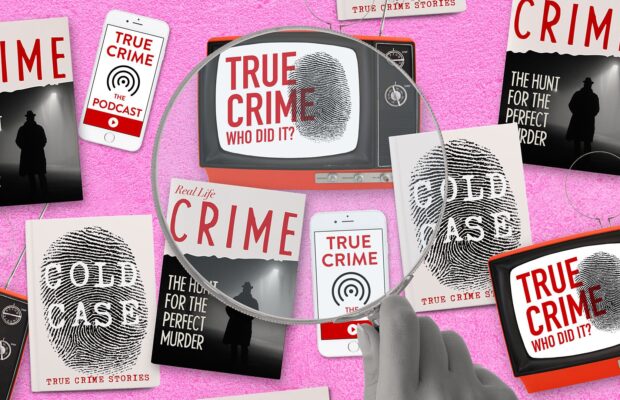Students react to popularity of true crime media

“I want to thank everyone out there who watched this show. It was a difficult one to make, a difficult one to watch, but I sincerely hope some good came out of it,” said Evan Peters at his Golden Globes acceptance speech for his award in the show Dahmer. Soon after, the mother of one of Dahmer’s victims, Shirley Hughes, responded to the speech. “There’s a lot of sick people around the world. People winning acting roles from playing killers keeps the obsession going. This makes sick people thrive on the fame. It’s a shame that people can take our tragedy and make money. The victims never saw a cent. We go through these emotions every day.”
The award and controversy surrounding it almost perfectly captures the controversy true crime has become. For some it’s an innocent interest and for others it’s a glorification of murder and violence.
Many students said they enjoy learning about the psychology of criminals, the process of solving crimes and using cases as a cautionary tale.
Junior Elliot Martin said, “I think it is interesting to see the reasons people commit crimes, and the public’s responses to these crimes. I am also interested in crime scene investigation, so that probably factors in too.”
Junior Nathan Standing said, “I like learning about the psychology of criminals and serial killers, What events lead up to them becoming that way. Learning not just about the murderer but also the victim.”
On the other side of the argument, many students have criticisms about how sensitive topics are treated by fans and creators of true crime alike. “It feels exploitative and disrespectful to victim’s families. I think people have a tendency to treat these crimes like fiction, but they’re real, awful things that happened to real people,” junior Ruth Haynes said, and former true crime fan juniorOliva Bartelt said, “It feels like it’s morphed into this awful circus. It’s like with the Idaho college murders and how a lot of misinformation was spread through social media ‘true crime’ influencers. That misinformation led to false accusations and harassment of innocent people. People just aren’t super respectful a lot of the time when they’re talking about real crimes that happened to real people.”
But it’s not black and white situation between fans and non-fans. “I don’t like the way things spread sometimes. I feel like if I were murdered, I wouldn’t want a bunch of people around the world making stories about it or romanticizing my killer,” Martin said, and junior Sophia Draves said, “When a case goes viral, it is really easy for the family of the victims to be negatively affected.”
Many fans agree that the cases get glorified or could cause unintended grief for the family and friends of victims, but they think that these issues are not inherent to the genre and there is media and sections of fandom that are respectful.
Regarding what could be changed about the genre, junior Aubrey Wieldman said, “I think that companies need to get consent from victims or their families before recreating events because murder is a very traumatic event, and it could open up old wounds and popularize people who committed terrible crimes, which could make others crave the attention,” and Bartelt said, “If people started taking discussions of true crime a little more seriously. I understand people’s fascination with the macabre, but it just sucks to see no discussion of the victims as people a lot of the time.”









You must be logged in to post a comment Login